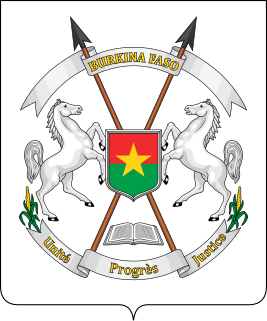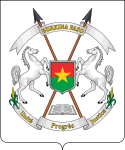
Burkina Faso is a landlocked country in West Africa with an area of 274,200 km2 (105,900 sq mi), bordered by Mali to the northwest, Niger to the northeast, Benin to the southeast, Togo and Ghana to the south, and the Ivory Coast to the southwest. It has a population of 20,321,378. Previously called Republic of Upper Volta (1958–1984), it was renamed Burkina Faso by President Thomas Sankara. Its citizens are known as Burkinabè, and its capital and largest city is Ouagadougou.

Thomas Isidore Noël Sankara was a Burkinabé military officer, Marxist–Leninist revolutionary, and pan-africanist, who served as President of Burkina Faso from his coup in 1983 to his deposition and murder in 1987. Viewed by supporters as a charismatic and iconic figure of revolution, he is commonly referred to as 'Africa's Che Guevara'.

The International Democrat Union (IDU) is an international alliance of centre-right political parties. Headquartered in Munich, Germany, the IDU consists of 84 full and associate members from 65 countries. It is chaired by Stephen Harper, former Prime Minister of Canada, two affiliated international organizations and six affiliated regional organizations.
The Reformist Movement is a liberal French-speaking political party in Belgium. MR is traditionally a conservative-liberal party, but it also contains social-liberal factions.

The Alliance for Democracy and Federation–African Democratic Rally is a liberal political alliance in Burkina Faso, consisting of the Alliance for Democracy and Federation and the former ruling party African Democratic Rally.
A big tent party, or catch-all party, is a term used in reference to a political party's policy of permitting or encouraging a broad spectrum of views among its members. This is in contrast to other kinds of parties, which defend a determined ideology, seek voters who adhere to that ideology, and attempt to convince people towards it.
Pargui Emile Paré is a Burkinabé politician and member of the People's Movement for Socialism/Federal Party (MPS/FP).

Change 2005 was a political alliance in Burkina Faso, founded to contest the presidential election in 2005. The incumbent, Blaise Compaore, was standing for a third term and was expected to win despite claims that another term in office would be unconstitutional. He was re-elected with 80.35% of the votes.
Articles related to Burkina Faso include:

Burkinabé literature grew out of oral tradition, which remains important. In 1934, during French occupation, Dim-Dolobsom Ouedraogo published his Maximes, pensées et devinettes mossi, a record of the oral history of the Mossi people. The oral tradition continued to have an influence on Burkinabé writers in the post-independence Burkina Faso of the 1960s, such as Nazi Boni and Roger Nikiema. The 1960s saw a growth in the number of playwrights being published. Since the 1970s, literature has developed in Burkina Faso with many more writers being published.

The Arab Socialist Ba'ath Party, also referred to as the pro-Iraqi Ba'ath movement, is a Ba'athist political party which was headquartered in Baghdad, Iraq until 2003. It is one of two parties which emerged from the 1966 split of the original Ba'ath Party.

The National Vanguard Party, is an illegal political party in Mauritania. It is the Mauritanian regional branch of the Iraqi-led Arab Socialist Ba'ath Party.
The Left Camp of Israel was a left-wing political party in Israel. It was also known as Sheli, an acronym for "Peace for Israel".

The Socialist Party is a French centre-left and social-democratic political party. It holds pro-European views. The PS was for decades the largest party of the "French Left" and used to be one of the two major political parties in the French Fifth Republic, along with The Republicans. It replaced the earlier French Section of the Workers' International in 1969 and is currently led by First Secretary Olivier Faure. The PS is a member of the Party of European Socialists, Progressive Alliance and Socialist International.

Sankarism is a term sometimes applied to denote a left-wing ideological trend within the politics of Burkina Faso, a landlocked country in West Africa, as well as the policies of the military government led by Captain Thomas Sankara. Sankara came to power in what was then the Republic of Upper Volta in a popularly supported 1983 military coup, and ruled until his assassination in a coup led by Blaise Compaoré in 1987.
The Committees for the Defense of the Revolution were a system of local revolutionary cells, established in Burkina Faso by the Marxist-Leninist and pan-Africanist leader Thomas Sankara, President of the country from 1983 until his assassination in 1987. Committees were established in each workplace. They were inspired by the Committees for the Defense of the Revolution in Cuba, and functioned as "organs of political and social control."

The Convention for Democracy and Federation is a political party in Burkina Faso.








